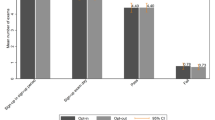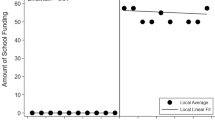Abstract
This study provides new evidence of the causal effect of the tenure system on grading leniency, teaching effectiveness, and student effort by taking advantage of a natural experiment in one public university in Taiwan. The results show that assistant professors subject to the tenure system tend to grade more leniently and fail fewer students, as opposed to assistant professors not affected by the policy. The tenure policy lowers the probability of failing a class by 15%. Teaching effectiveness measured by the valued-added model also falls significantly by 0.32 standard deviation of the average grades in subsequent courses, roughly 6.6% of the sample means. The effect on student effort also is significant. Study time and class absences decline by 3 and 10%, respectively. The results suggest that the tenure system reduces teaching effectiveness and leads to lenient grading. Moreover, although used as a measure of teaching effectiveness in tenure promotion, student evaluation of teaching cannot truly reflect teaching quality.
Similar content being viewed by others
Notes
McKenzie (1975), Feldman (1976), Nelson and Lynch (1984), Goldman (1985), Goldberg and Callahan (1991), and Tatro (1995), Krautmann and Sander (1999), Eiszler (2002), Kanagaretnam et al. (2003), Yunker and Yunker (2003) and Iris Franz (2010) all show that professors have an incentive to entice students to obtain better evaluations by giving easy grades. In contrast, only a few papers fail to find a significant effect of using student ratings in tenure decisions on grade inflation (Marsh and Hocevar 1991; Marsh and Roche 2000).
Assistant professors appointed before fall 2005 have no time limit on the years taken to obtain tenure. Appointment will be automatically renewed every 2 years.
A student fails a class if he/she receives a grade below 60 and will be required to repeat the course.
We report the estimates from regression including student effort. The results from the regression excluding student effort are similar.
The results of the randomness check are available upon request.
The results excluding student effort are similar.
We replicate the procedure 500 times.
References
Achen AC, Courant PN (2009) What are grades made of? J Econ Perspect 23:77–92
Anglin PM, Meng R (2000) Evidence on grades and grade inflation at Ontario’s universities. Can Public Policy 26:361–368
Babcock P (2010) Real costs of nominal grade inflation? New evidence from student course evaluations. Econ Inq 48:983–996
Bar T, Kadiyali V, Zussman A (2009a) Grade information and grade inflation: the Cornell experiment. J Econ Perspect 23:93–108
Bar T, Kadiyali V, Zussman A (2009b) Putting grades in context. Johnson School Research Paper Series no. 26-09, Cornell University
Braga M, Paccagnella M, Pellizzari M (2014) Evaluating students’ evaluations of professors. Econ Educ Rev 41:71–88
Braga M, Paccagnella M, Pellizzari M (2016) The impact of college teaching on students’ academic and labor market outcomes. J Labor Econ 34(3):781–822
Brown DL (1976) Faculty ratings and student grades: a university-wide multiple regression analysis. J Educ Psychol 68(5):573–578
Carell SE, West JE (2010) Does professor quality matter? Evidence from radom assignment of students to professors? J Polit Econ 118:409–432
Cavanaugh JK (2006) What did you get? A faculty grade comparison. Quality Assur Educ 14(2):179–186
Eiszler CF (2002) College students’ evaluations of teaching and grade inflation. Res High Educ 43(4):483–501
Feldman KA (1976) Grades and college students’ evaluations of their courses and teachers. Res High Educ 4(1):69–111
Figlio DN, Schapiro MO, Soter KB (2015) Are tenure track professors better teachers? Rev Econ Stat 97(4):715–724
Goldberg G, Callahan J (1991) Objectivity of student evaluations of instructors. J Educ Bus 66(6):377–378
Goldhaber D, Hansen M (2010) Using performance on the job to inform teacher tenure decisions. Am Econ Rev 100(2):250–255
Goldman L (1985) The betrayal of the gatekeepers: grade inflation. J Gen Educ 37:97–121
Greenwald AG, Gillmore GM (1997a) Grading leniency is a removable contaminant of student ratings. Am Psychol 52(11):1209
Greenwald AG, Gillmore GM (1997b) No pain, no gain? The importance of measuring course workload in student ratings of instruction. J Educ Psychol 89(4):743
Hanushek EA, Rivkin SG (2010) Generalizations about using value-added measures of teacher quality. Am Econ Rev 100(2):267–271
Iris Franz WJ (2010) Grade inflation under the threat of students’ nuisance: theory and evidence. Econ Educ Rev 29:411–422
Johnson VE (2003) Grade inflation: a crisis in college education. Springer, New York
Kanagaretnam K, Mathieu R, Thevaranjan A (2003) An economic analysis of the use of student evaluations: implications for universities. Manag Decis Econ 24:1–13
Kezim B, Pariseau SE, Quinn F (2005) Is grade inflation related to faculty status? J Educ Bus 80(6):358–364
Kolevzon MS (1981) Grade inflation in higher education: a comparative study. Res High Educ 15:195–212
Krautmann AC, Sander W (1999) Grades and student evaluations of teachers. Econ Educ Rev 18:59–63
Love DA, Kotchen MJ (2010) Grades, course evaluations, and academic incentives. East Econ J 36(2):151–163
Marsh HW, Hocevar D (1991) Students’ evaluations of teaching effectiveness: the stability of mean ratings of the same teachers over a 13-year period. Teach Teach Educ 7(4):303–314
Marsh HW, Roche LA (2000) Effects of grading leniency and low workload on students’ evaluations of teaching: popular myth, bias, validity, or innocent bystanders? J Educ Psychol 92(1):202
McCaffrey DF, Lockwood JR, Koretz D, Louis TA, Hamilton L (2004) Models for value-added modeling of teacher effects. J Educ Behav Stat 29(1):67–101
McKenzie RB (1975) The economic effects of grade inflation on instructor evaluations: a theoretical approach. J Econ Educ 6:99–105
Moore M, Trahan R (1998) Tenure status and grading practices. Sociol Perspect 41:775–781
Nagle Brian (1998) A proposal for dealing with grade inflation: the relative performance index. J Educ Bus 74(1):40–43
Nelson JP, Lynch KA (1984) Grade inflation, real income, simultaneity, and teaching evaluations. J Econ Educ 15:21–37
Raudenbush SW, Bryk AS (2002) Hierarchical linear models: applications and data analysis methods. Sage, Beverly Hills
Rivkin SG, Hanushek EA, Kain JF (2005) Teachers, schools, and academic achievement. Econometrica 73(2):417–458
Rothstein Jesse (2010) Teacher quality in educational production: tracking, decay, and student achievement. Q J Econ 125(1):175–214
Rovovsky H, Hartley M (2002) Evaluation and the academy: are we doing the right thing?. American Academy of Arts and Sciences, Cambridge
Sabot R, Wakeman-Linn J (1991) Grade inflation and course choice. J Econ Perspect 5:159–170
Sonner BS (2000) A is for “adjunct”: examining grade inflation in higher education. J Educ Bus 76(1):5–8
Tatro CN (1995) Gender effects on student evaluations of faculty. J Res Dev Educ 28(3):169–173
Weinberg BA, Hashimoto M, Fisher BM (2009) Evaluating teaching in higher education. J Econ Educ 40:227–261
Yunker PJ, Yunker JA (2003) Are student evaluations of teaching valid? Evidence from an analytical business core course. J Educ Bus 78(6):313–317
Acknowledgements
The author wishes to thank the Office of Institutional Research at the University of Kaohsiung for sharing the data. The generous financial support provided by the Ministry of Science and Technology (MOST-105-2410-H-390-001-MY2) is gratefully acknowledged.
Author information
Authors and Affiliations
Corresponding author
Appendix
Rights and permissions
About this article
Cite this article
Keng, SH. Tenure system and its impact on grading leniency, teaching effectiveness and student effort. Empir Econ 55, 1207–1227 (2018). https://doi.org/10.1007/s00181-017-1313-7
Received:
Accepted:
Published:
Issue Date:
DOI: https://doi.org/10.1007/s00181-017-1313-7




